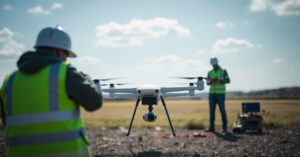IIT Kanpur & Indian Army Unveil Game-Changing UAV Training Tech – 2 Powerful Simulators to Cut Costs & Risks
IIT Kanpur has teamed up with the Indian Army’s Central Command to develop advanced simulation technology for training UAV operators. This collaboration focuses on two cutting-edge systems—the Remote Piloting Training Module (RPTM) and the Software-in-the-Loop Simulator (SITL)—designed to create realistic virtual environments for cost-effective and risk-free training. These simulators will allow operators to practice reconnaissance, surveillance, and tactical missions without requiring live exercises. Dr. Subrahmanyam Saderla from IIT Kanpur’s Aerospace Engineering Department highlighted that these systems will enhance decision-making and operational efficiency.
The project, being developed at IIT Kanpur’s UAV Laboratory in partnership with a private firm, is set to be completed within six months. Professor Manindra Agrawal, Director of IIT Kanpur, emphasized the institute’s commitment to strengthening India’s defence capabilities through research and innovation. By reducing training costs and improving preparedness, this initiative marks a major step in fostering collaboration between academia and the military. IIT Kanpur, known for its contributions to aerospace technology, continues to drive innovation through research and support for defence-focused startups.

IIT Kanpur & Indian Army Unveil Game-Changing UAV Training Tech – 2 Powerful Simulators to Cut Costs & Risks
In a major step toward modernizing military training, IIT Kanpur has partnered with the Indian Army’s Headquarters Central Command to develop advanced simulation tools for training Unmanned Aerial Vehicle (UAV) operators. This collaboration aims to enhance UAV training by making it safer, more cost-effective, and efficient through cutting-edge virtual simulation technology. The initiative underscores how academia and defense forces can work together to strengthen India’s military preparedness.
Innovative Training Systems for Real-World Scenarios
The project focuses on two groundbreaking systems: the Remote Piloting Training Module (RPTM) and the Software-in-the-Loop Simulator (SITL). These tools will replicate realistic combat and operational environments, allowing trainees to practice critical tasks such as reconnaissance, surveillance, and tactical strikes without deploying actual UAVs. By simulating diverse scenarios—from routine maneuvers to high-stakes missions—the systems aim to sharpen operators’ decision-making skills while reducing the risks and costs associated with live exercises.
Dr. Subrahmanyam Saderla, an associate professor in IIT Kanpur’s Aerospace Engineering Department, highlighted the value of these simulators. “Trainees can master complex UAV operations in a controlled, risk-free setting. The RPTM and SITL expose them to challenges that are either too dangerous or impractical to recreate in real life,” he explained. For example, operators can repeatedly practice emergency responses or navigate harsh weather conditions virtually, building confidence and expertise before handling actual missions.
Cost Savings and Accessibility
One of the key advantages of this technology is its potential to significantly reduce training costs. Traditional UAV training exercises require fuel, equipment maintenance, and carry the risk of damage during drills. Virtual simulations eliminate these expenses, allowing operators to train as frequently as needed without physical deployments. Additionally, the system makes high-quality training more accessible, enabling more personnel to refine their skills using advanced tools.
Collaborative Development with a Tight Deadline
The project is being developed at IIT Kanpur’s UAV Laboratory in collaboration with a private firm, with completion expected within six months. Leading the effort are Prof. Saderla and his team of students—Neetesh, Sagar, Kishore, Vamshi, and Abhishek. Their work showcases the institute’s emphasis on hands-on innovation and its ability to deliver practical solutions for national defense.
Strengthening India’s Defense Capabilities
IIT Kanpur’s Director, Prof. Manindra Agrawal, emphasized the strategic significance of this initiative. “This project reflects our commitment to advancing India’s self-reliance in defense technology. By merging academic expertise with military needs, we’re not just improving training methods but also contributing to national security,” he said. IIT Kanpur’s Aerospace Engineering Department has long been a leader in UAV research, and this project adds to its legacy of pioneering work in drones, robotics, and aviation systems.
Broader Impact on Academia-Defense Collaboration
This partnership sets a precedent for future collaborations between academic institutions and the armed forces. By bridging theoretical research with real-world applications, such initiatives can accelerate the development of indigenous technologies tailored to India’s defense requirements. Prof. Saderla noted that the simulators could eventually be adapted for civilian applications, such as disaster management and commercial drone operations, further broadening their impact.
IIT Kanpur’s Role in Nation-Building
Established in 1959 and designated an Institute of National Importance, IIT Kanpur has been a driving force in science and technology innovation. Beyond defense, its Start-up Incubation and Innovation Centre supports entrepreneurs in fields like robotics, semiconductors, and aerospace, fostering a culture of creativity and self-sufficiency. This project reinforces the institute’s mission to address national challenges through research while preparing a skilled workforce for emerging technologies.
Looking Ahead
As UAVs become increasingly vital in modern warfare, advanced training systems will play a crucial role in maintaining tactical superiority. IIT Kanpur’s simulators have the potential to revolutionize how India’s armed forces prepare for missions, ensuring operators are well-equipped to handle both current and future threats. By fostering innovation and collaboration, initiatives like this not only enhance military readiness but also position India as a global leader in defense technology.
In summary, the partnership between IIT Kanpur and the Indian Army marks a significant advancement in UAV training. By prioritizing safety, affordability, and realism, this project exemplifies how technology can transform defense preparedness while paving the way for similar breakthroughs across various sectors.
You must be logged in to post a comment.